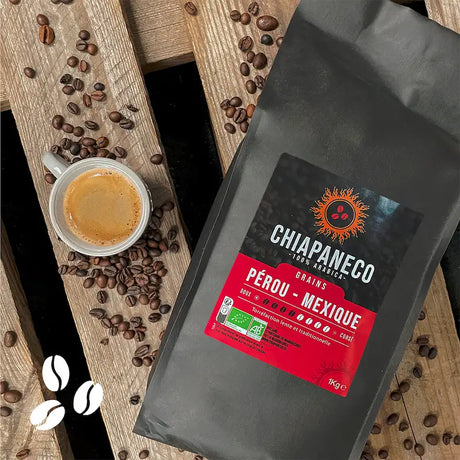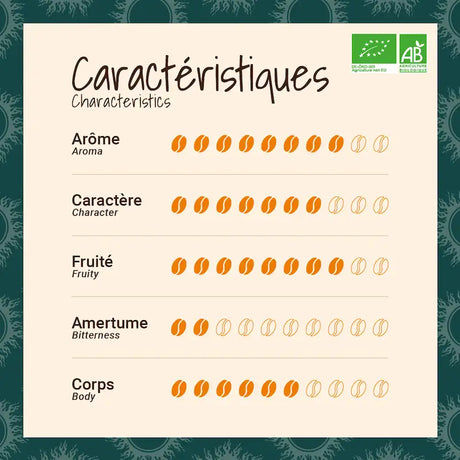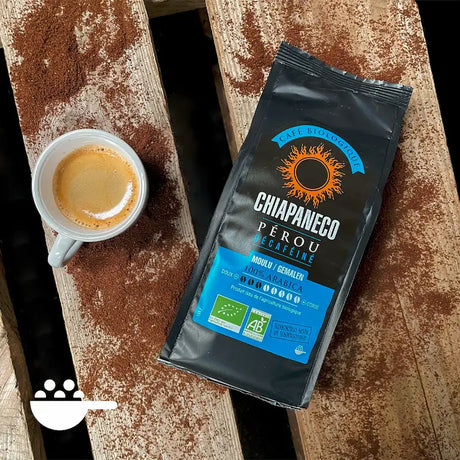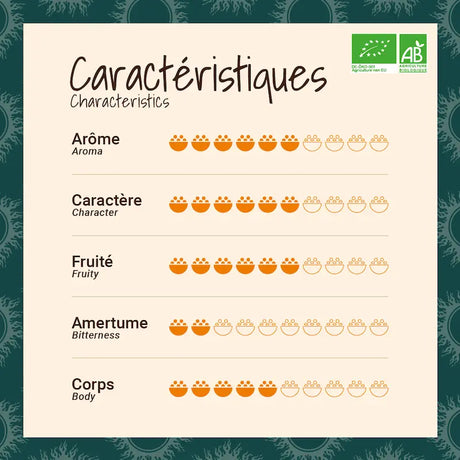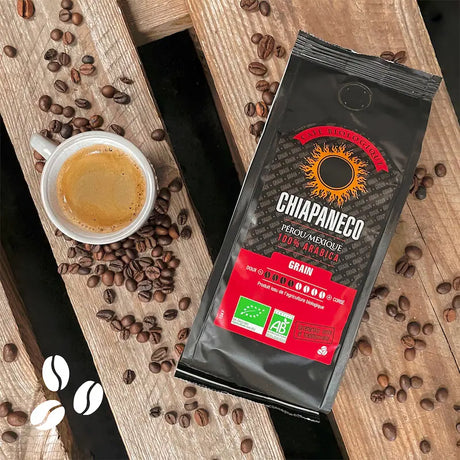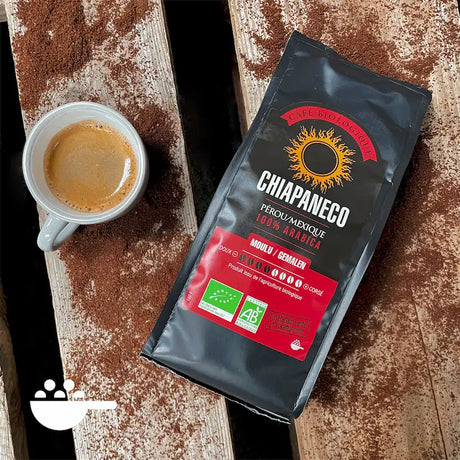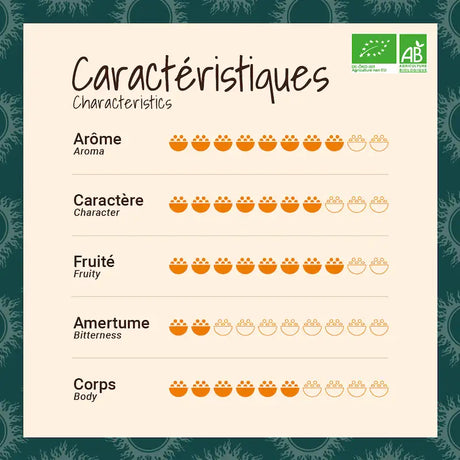The different types of coffee

Among the different types of coffee, the two most well-known varieties are Arabica and Robusta . Each variety has its own distinct characteristics, influencing its taste, texture, and even health benefits.
In this article, we explore the difference between Arabica and Robusta, emphasizing the benefits of opting for an organic coffee like the one you'll find on our site:
100% Arabica: Refined and smooth coffee
Arabica coffee is the most popular variety among coffee lovers worldwide. It accounts for between 60 and 70% of global production. Renowned for its subtle aromas, floral or fruity notes, and low caffeine content, Arabica coffee seduces with its smoothness and complexity on the palate.
Grown at altitude, often between 800 and 2,000 meters, this coffee tree grows in regions with a cool, shaded climate. Its cultivation is demanding: it fears both high heat and excess humidity. The finest vintages of Arabica coffee are found in Mexico, Peru, Brazil, Colombia, Ethiopia and Kenya.
The organic Arabica coffee in the Chiapaneco range comes mainly from farms in Mexico and Peru. It is grown at high altitudes with respect for producers and the environment. A smooth, ethical and tasty coffee.
Characteristics of 100% Arabica coffee:
- Taste: Sweet, mild, with floral, fruity and sometimes chocolatey notes.
- Caffeine: Contains less caffeine than Robusta (approximately 1.2%).
- Coffee bean shape: a longer, rather uneven bean.
- Texture: Light and silky texture.
- Acidity: Moderate acidity that can vary depending on the growing region.

This coffee is often preferred by connoisseurs because of its finesse and nuanced flavors.
The organic Arabica coffee you'll find on Chiapaneco.eu is grown without pesticides or chemicals, ensuring a pure, natural taste. We use the same Arabica for our caffeine-free coffee.
Robusta: Stronger and more full-bodied

The Robusta shrub accounts for about 35% of global production and generally grows at lower altitudes.
Robusta grows primarily in low-lying tropical regions , between 200 and 800 meters , and in warm, humid climates . It is more resistant to heat, disease, and humidity than Arabica , allowing it to grow in areas where the latter does not thrive.
Characteristics of Robusta:
- Taste: Bitter, earthy, with notes of wood and sometimes spices.
- Caffeine: Contains approximately 2.2% caffeine.
- Coffee bean shape: a fairly small, rounded bean with a straight, slightly sinuous central groove.
- Texture: Thicker and less soft.
- Acidity: Less acidic than Arabica, but more powerful.
Robusta Coffee: an intense coffee with a generous crema
Robusta coffee is prized for its high caffeine content, up to twice that of Arabica. It is a full-bodied coffee with a powerful, sometimes woody or earthy taste that awakens you from the first sip .
Often used in espresso blends, Robusta provides structure and a dense, persistent crema . Its insoluble components—particularly oils and proteins—play a key role in forming a beautiful golden foam.
While it may seem too robust for sensitive palates, it remains the ideal choice for those looking for an energizing coffee with character.
Arabica or Robusta: Which coffee to choose?
The choice between the two depends largely on personal taste preferences. If you prefer a mild, aromatic coffee with a pleasant acidity, Arabica is probably your best option.
On the other hand, if you like a stronger, full-bodied and energizing coffee with a magnificent Crema, Robusta will be more suitable.
The benefits of organic coffee

Organic coffee is grown without chemicals, pesticides or synthetic fertilizers, which helps preserve the biodiversity of soils and ecosystems.
By purchasing 100% organic Arabica coffee from Chiapaneco.eu , you are not only supporting sustainable agriculture, but you are also ensuring that you are enjoying high-quality whole bean or ground coffee, free from chemical residues.
Our slow roasting allows us to obtain the best types of coffee.
The benefits of organic coffee:
- Respect for the environment: Less pollution, less deforestation, and preservation of biodiversity.
- Health: Less exposure to chemicals and pesticides.
- Higher Quality: Responsibly grown coffee often has a purer, richer taste.
- Roasting : slow, respectful of the product. We give the bean time to deliver its best.
Why choose Chiapaneco for your organic coffee?
At www.chiapaneco.eu , we offer you quality organic coffee , grown in ideal conditions to preserve the natural flavors of the beans. We carefully select our producers, who practice sustainable and environmentally friendly agriculture.
Whether you are a fan of organic Arabica coffee (Peru/Mexico) or an espresso blend with Robusta (India/Uganda) , we have something to satisfy your tastes while respecting our planet.
Conclusion

